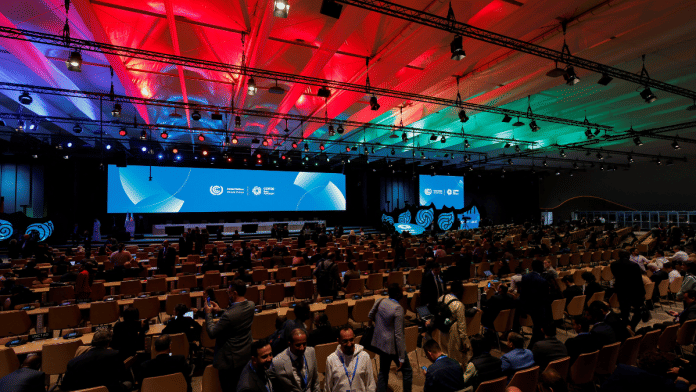New Delhi: The annual United Nations climate summit Conference of Parties or COP29 opened Monday in Azerbaijan with renewed calls for a climate finance goal amidst the noticeable absence of prominent world leaders.
At the plenary session of the summit’s 29th edition in Azerbaijan capital Baku, United Nations Framework Convention on Climate Change (UNFCCC) executive secretary Simon Stiell appealed for an ambitious new goal in providing climate funding to the world’s poorer nations. He said this would be in the interest of every country, including the largest and the wealthiest.
Day-1 of COP29 started with a significant delay in the adoption of the agenda after a disagreement between the developing and developed nations on the dialogue on finance under the global stocktake—a process that assesses how well countries are working to meet the goals set by the Paris Accords. The agenda was finally accepted with a “compromise” late Monday.
“But it’s not enough to just agree on a goal. We must work harder to reform the global financial system… giving countries the fiscal space they so desperately need,” Simon Stiell said in his address. “If at least two-thirds of the world’s nations cannot afford to cut emissions quickly, then every nation pays a brutal price.”
The summit’s top agenda is a deal for up to $1 trillion in annual climate finance for developing countries, replacing the existing target of $100 billion.
Also read: US President-elect Donald Trump’s take on climate change: ‘Green scam, not our problem’
Thin attendance, Modi to miss as well
Though the summit is being dubbed as the “finance COP”, world leaders from many countries have confirmed they won’t attend it. Prominent among them are US President Joe Biden, European Commission President Ursula von der Leyen, France’s Emmanuel Macron, and the president of Brazil, Luiz Inácio Lula da Silva.
German Chancellor Olaf Scholz, who is consumed in a political crisis after the collapse of his ruling coalition, will also be absent. Leaders from China, Japan, and Prime Minister Narendra Modi and Union Environment Minister Bhupender Yadav have also given this year’s COP a miss, citing “prior engagements”.
The interministerial Indian delegation is being led by the minister of state for environment, forests and climate change (MoEFCC) Kirti Vardhan Singh; MoEFCC secretary Leena Nandan is his deputy; MoEFCC additional secretary Naresh Pal Gangwar is the lead negotiator; and joint secretary, MoEFCC, Neelesh Sah deputy lead negotiator.
Apart from the absence of the global who’s who, the reelection of Donald Trump as US president has also cast a shadow over climate negotiations and commitments. Environmentalists and policy experts are worried that a Trump-led America would back out of its commitments and derail climate change policies.
Trump’s track record during his first stint at the White House did not inspire much confidence. In 2020, the US withdrew from the Paris Agreement on climate change. Calling the agreement unfair, Trump said the document allowed countries like India and China to continue using fossil fuels, while it imposed heavy restrictions on the US. The same fate is likely again.
What to expect this year
Welcoming the delegates at the plenary session, Azerbaijan’s ecology minister Mukhtar Babayev – also the president of COP29 – said that “climate change is already here”, and reminded nations they needed to come together to fight its impact. “COP29 is the unmissable moment to chart a new path forward for everyone,” he said.
This year’s hosts are tasked with ensuring that countries agree to a new global finance target deal to replace the existing $100 billion pledge expiring this year. The new finance deal, the players, the beneficiaries will all be areas of contention this year.
Arunabha Ghosh, CEO of the Council on Energy, Environment and Water, said COP29 must prioritise the protection of the most vulnerable. He stressed the climate summit should not only focus on raising the quantum of climate finance but also improve its quality.
“Climate finance must be consistent, convenient, catalytic, and credible. No developed country has delivered 100 percent of its pledged climate finance. As we debate the New Collective Quantified Goal, the question is not just how much is needed, but how reliably it will be delivered,” he said.
Experts said that raising climate finance will be important, especially with the catastrophic impact of climate change felt globally. In 2024 alone, devastating heatwaves and life-threatening floods impacted both developed and developing countries.
Hisham Mundol, the Indian chief advisor of US-based nonprofit Environmental Defense Fund, explained that operationalising the Fund for Loss and Damage (FRLD) at COP29 would be crucial for addressing the disproportionate impact of climate change on vulnerable nations.
“By demonstrating global solidarity and supporting climate adaptation and resilience, the FRLD can foster international cooperation and stimulate investment in green technologies,” Mundol said. He added that agreeing on the FRLD would set a precedent for future climate finance mechanisms, and ensure adequate funding for climate action.
(Edited by Tikli Basu)
Also read: No star power at COP29. Heads of key countries plan to sit out climate summit







Concessional finance for developing countries is only one of the urgent issues before COP. A target of $ 100 billion year set in Copenhagen in 2009 took a decade to achieve. Moving to $ 1 trillion a year will be immeasurably more difficult. The key issue is a faster phase out of fossil fuels, switching off the furnace that is igniting climate change all over the planet. India, as # 3 emitter and one of the few countries still building new coal fired power plants has to do more. More visible and audible in Baku.